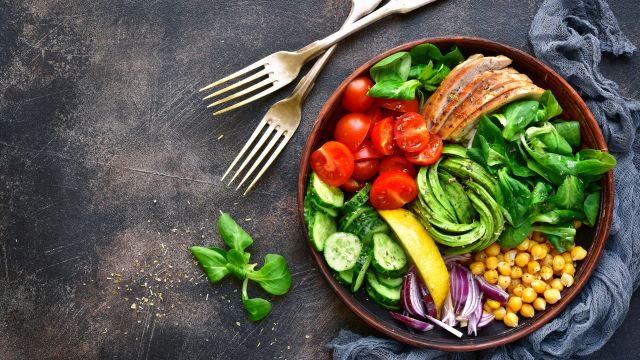Updated on April 4, 2024.
The standard advice for losing weight has long been to eat fewer calories than you burn. But a study suggests this might not paint the whole picture.
Results from the clinical trial, published in 2018 in JAMA, showed that reducing intake of foods with added sugars, refined carbohydrates, and other processed products was linked to more weight loss, without having to actively restrict calories or control portion sizes. Many study participants cut calories naturally by eating healthy, whole-food diets.
"The old calories-in, calories-out philosophy has dominated for decades, but it's a very antiquated, overly simplistic way to look at what we eat," says Darria Long-Gillespie, MD, an emergency department physician and clinical assistant professor at the University of Tennessee.
So, what does this mean for weight loss?
The study—a breakdown
Researchers conducted the year-long study to examine whether genes help determine the best diet for individuals. They included 609 overweight adults between the ages of 18 and 50 and tested two diets—healthy low fat (HLF) and healthy low carb (HLC).
Participants were randomly assigned to either the HLF or HLC eating plan for 12 months. Both diets encouraged consumption of healthy, whole foods like fruits, vegetables, whole grains, and lean meats, rather than processed goods. Low-fat eaters were urged to consume high-quality carbohydrates, like brown rice, whole grain oats, and beans. The low-carb diet emphasized healthier fats, like nuts and nut butters, grass-fed animal products, and fish. Prepackaged foods were discouraged, regardless of their low-carb or low-fat labels. Calories were unrestricted and participants were urged to eat until they felt satisfied.
Although the study didn't reveal a connection between genes and your likelihood of losing weight, it did suggest something interesting: If you eat healthy, unprocessed foods, you might lose weight—and you may not even have to consciously restrict calories.
By the end of the study, most participants lost weight, and there was little difference in the amount of weight loss between the two diets. On average, HLC eaters lost 13.2 pounds and HLF dieters dropped 11.7 pounds.
Why whole foods work for weight loss
Several factors are likely at play when it comes to managing weight. For one, processed foods, especially refined carbohydrates, affect your blood sugar in a way that may interefere with weight management. Simple carbohydrates, found in white bread, pasta, bakery treats, and other processed foods, cause your blood sugar (or blood glucose) to spike. As blood sugar levels rise, a hormone that helps regulate blood suguar, called insulin, is produced. This cycle can increase your risk for weight gain.
That's not all. "When your glucose levels rise, they very quickly plummet, making you crash and feel hungry again," Dr. Long-Gillespie says. Regularly reaching for extra snacks can add to your daily calorie count.
Whole foods, on the other hand, can help keep you feeling satisfied. Weight loss-friendly foods—vegetables, fruits, whole grains, and beans—don't contain unnecessary saturated fats, added sugars, or extra calories. Instead, they're packed with nutrients, like fiber, that help keep you fuller, longer.
"Eating high-quality foods that have a combination of fiber, protein, and good fats is important," Long-Gillespie says. "Not only do they tend to be rich in nutrients your body needs, they're also going to make you feel fuller and more satiated."
Still, the number of calories you eat is important. Consuming too many—even the healthy kind—can hinder weight loss and may result in weight gain. "We're not saying that calories don't matter at all. They do," Long-Gillespie says. "They're just not the end-all, be-all.”
Healthy tips for losing weight
Including plenty of whole foods in your diet is a good place to start, but there are a number of other ways to modify your lifestyle to promote weight loss. And they don’t include calorie counting or swearing off your favorite meals.
Start by limiting processed, prepackaged foods. "The best way to do that is by replacing those highly processed foods with better-quality foods," Long-Gillespie recommends. A healthy diet incorporates vegetables, fruit, whole grains, lean meats, and healthy sources of fat, like avocado, olive oil, and nuts.
Swapping in high-quality foods can be simple:
- Opt for plain, nonfat Greek yogurt instead of mayonnaise in your tuna salad or sour cream on your chili.
- Replace calorie-rich salad dressing with freshly squeezed lemon juice and a sprinkle of herbs and spices.
- Blend a frozen banana with unsweetened cocoa powder as a replacement for ice cream.
- Try almond milk and cinnamon instead of cream and sugar in your coffee.
In addition to healthy swaps, you can also try these other slimming strategies:
Plan healthy snacks: This is an effective way to prevent reaching for vending machine treats or overeating at your next meal. Keep your energy levels up throughout the day by preparing snacks like a handful of almonds, air-popped popcorn, baby carrots, and mashed avocado or a banana and natural peanut butter.
Keep a food journal: When you keep track of the foods you eat each day, you become more aware of your choices. A 2019 study found that participants who were overweight or obese benefitted from logging meals. Those who journaled more frequently lost the most weight over six months. To keep tabs on your diet, use a handwritten log or a phone app, like Sharecare, available for iOS and Android.
Eat mindfully: When you are more mindful of the food you eat and how you eat it, can also increase your awareness of what and how much you consume. It may help prevent you from taking meals in front of the television or computer, as well, which can lead to overeating.
Get more daily physical activity: This benefits your overall health and can help boost weight loss. Experts recommend at least 150 minutes of moderate-intensity physical activity or 75 minutes of vigorous-intensity physical activity each week, plus at least two days of strength training activity weekly. If you're trying to lose weight, shoot for more activity. Adding extra steps to your day—like walking to work, taking a stroll on your lunch break, or skipping the elevator—can help.
Bottom line: If you’re looking to lose weight, focusing your attention on whole foods is a good place to start.







